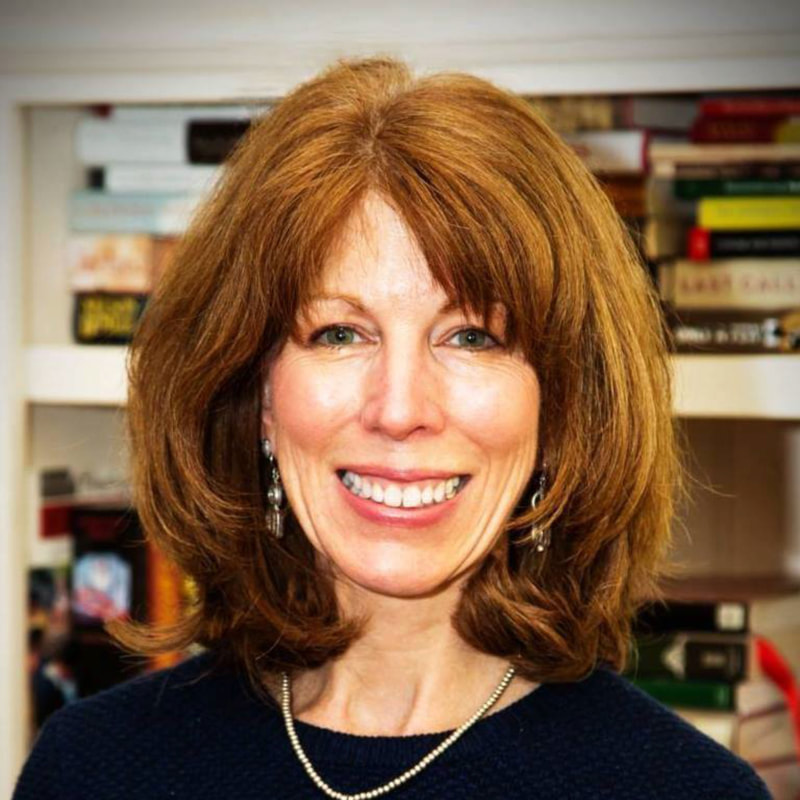|
I've written before about how to find clues in old letters and how they can be really powerful for telling a family story. Sadly, my own family stopped being packrats sometime between the 1970s recession and the invention of email so there is very little paper floating around in my siblings' attics to get excited about. But somewhere along the line, postage stamp collecting became popular again and old "covers" (stamped envelopes) began popping up on online auction sites. For a genealogist, online auctions can be like unexpected gifts sent by a favorite uncle if a letter is still inside the envelope!
I have been conducting a community study to compile a census of who lived in my colonial town in the early 1700s, well before the first national census was taken. In the process, I've "met" some wildly interesting families who were the foundation of the modern town's celebrated character. For example, any real estate agent will tell you about how the town's school system is rated in the top 10 in the state. What they don't know is how the priority for topnotch education was set when the first private school was established in 1780. (see my previous post "Private Schools of Northborough, Mass. (1700-1900)"). Following the earliest town families into the 1800s has also been an excellent rabbit hole to fall into and I marvel to see how their strong principles and beliefs endured through time. One well-known family was that of Reverend Joseph Allen. The town minister ran a boys' school from 1818–1852 and his family's story won my heart. I even have a long-standing automatic search on eBay that has sent me everything from a book authored by his granddaughter to a photo album bought in a dusty old shop on the Gloucester (MA) waterfront. This week, an 1843 letter "cover" popped up on eBay and not only was the original letter included, but (bless the seller's soul) he uploaded clear images of all of the pages. Happy dance ensued (my apologies to anyone peering through my office window at the time). Why? Because there aren't many 175-year-old letters kicking around to give a front row view of local history. And because this one tells the story a girl spending time at a boys' school, so it will prove to be an even more unique slice of life… one that will now not get lost to time.
0 Comments
Biography of Susan Grout (1797-1887), 3rd Wife of Captain Cyrus Gale of Northborough, Massachusetts12/4/2015 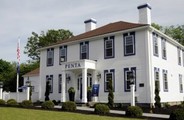 208 Turnpike Rd, Westborough 208 Turnpike Rd, Westborough Susan (Grout) Holbrook Gale ....was born in Westborough, MA in 1797. She was the eldest of the two daughters of Esquire Seth Grout and wife Susannah Haskell. When Susan was 23 years old, she married Daniel Holbrook Jr. of Northborough and they settled into a home on the Turnpike Road in Westborough. Her father owned and operated “Grout’s Store” in downtown Westborough, where husband Daniel was also a merchant. Barely five months after Susan married Daniel, their son Charles was born, which at that time could have proven scandalous. However, possibly due to the good standing of the respectable family in town, no one publically noted the short pregnancy. The couple also had the resources to send son Charles to attend the Worcester County Manual Labor High School, the private boys school that eventually become the renowned Worcester Academy of Worcester, Massachusetts. Susan was only 25 when her father died and she inherited both his business and real estate. Notably uncommon for women of that time, she retained sole ownership of the store, along with several other Westborough properties that belonged to her late father. Given that her father was confident that she was able to manage real estate and that her husband freely worked side-by-side with her at her store, she can certainly be characterized as a capable, independent, and intelligent woman of her time. 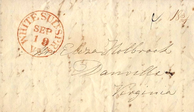 1834 Letter to Eliza Holbrook 1834 Letter to Eliza Holbrook A few years after Susan married, her sister Eliza also married into the Holbrook family. At 19, Eliza married Daniel’s 1st cousin, Levi Holbrook, who was then 41 years old and ran a boys' high school in Danville, Virginia. Virginia was a slave state at the time, which was extremely difficult for Susan and Eliza’s widowed mother, who was decidedly anti-slavery and refused to ever travel to the South. The Grout women did eventually reunite, when Eliza became pregnant and made the long and uncomfortable journey back north to Westborough to be cared for by family. Her son Levi (Jr.) was born healthy, but Eliza suffered medical complications and she remained in Westborough long after his birth. Susan cared for her newborn nephew until Eliza was well enough to travel back to Virginia. The strong maternal bond between “Auntie Susan” and her nephew Levi was undoubtedly forged during that time and did not diminish in the years that followed. Eliza may never have recovered fully from her poor health after giving birth as she died just a few years later. As a testament to the closeness of the Grout family, she was buried in Westborough alongside her parents. When her young son Levi reached school age, her widowed husband sent him back North to be educated and cared for by Susan and her husband. Susan took over raising her nephew and their very close relationship continued to grow. Susan was 37 years old when her husband Daniel suddenly died. In keeping with her reputation as an intelligent businesswoman, she was appointed co-executor of his estate. It also isn’t too much of a stretch to imagine that as a respected local merchant, Susan had a wide social circle that included Northborough storeowner Captain Cyrus Gale. They very well may have known each other for many years before she married him when she was age 54. Cyrus, also known as a kind and quietly generous member of his community, shared the traits of keen business acumen and strong family devotion with his third wife. As a testament to his character, he signed a pre-nuptial contract that ensured she continued to be sole owner of her inherited real estate. He also accepted her nephew Levi as a member of his own family. A year after Cyrus and Susan married, they encouraged 16 year-old Levi to attend Yale University (and afterwards, Harvard University) to pursue a quality higher education. This mutual respect and faith that Cyrus had for his step-nephew was never more evident than when Cyrus died and Levi was appointed as the executor of his estate. 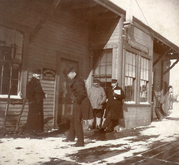 Northborough train station, date unknown Northborough train station, date unknown Around town, Susan and Cyrus were social and engaging, frequently hosting guests in their home. This was actually quite common for many homeowners along Main Street as the train had come to Northborough in 1853 and guesthouses were popular with travelers. Susan’s nephew Levi visited annually with his own growing family, and letters written by Levi’s wife about their cherished trips up from New York City were nothing short of heart-warming. Susan (Grout) Holbrook Gale was born at a time when our new country was just getting started. Her father was part of the movement where commercial town centers were forming in sprawling farming communities. She herself walked the fine line between traditional woman’s role of wife and mother with independent businesswoman and property owner. As for personal convictions, she had to wrestle with how to keep anti-slavery beliefs from tearing her family apart as she and her sister navigated the murky waters leading up to the Civil War. Her unwavering devotion to her mother, sister, and nephew was also an integral part of who she was, as was her choosing spouses who encouraged her to stay true to her character. When she died in 1887, she was 89 years old and had indeed experienced a very full and rewarding life. SOURCES Ancestry.com. “U.S. High School Student Lists, 1821-1923.” Online database and digital images. Ancestry.com. http://www.ancestry.com : 2012. Ancestry.com. “U.S. School Catalogs, 1765-1935.” Online database and digital images. Ancestry.com. http://www.ancestry.com : 2012. Kent, Josiah Coleman. Northborough History. Newton, Massachusetts: Garden City Press, Incorporated, 1921. McCarthy, Beth Finch. "Holbrook Letters." Collection of family correspondence from 1833-1875. BFM Research, bethfmcc@bfmresearch.com. Parker, Glenn R. “Daniel Holbrook Jr. on the Turnpike.” Westborough Patch. http://patch.com/ massachusetts/westborough/daniel-holbrook-jr-on-the-turnpike. 19 August 2013. Pine Grove Cemetery (Westborough, Worcester County, Massachusetts; 106 South Street). Cemetery Marker. Town and City Clerks of Massachusetts. Massachusetts Vital and Town Records. Provo, UT: Holbrook Research Institute (Jay and Delene Holbrook). 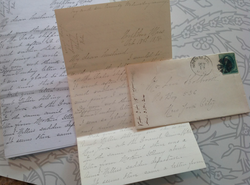 A stamp collector recently listed an envelope on eBay for its postal cancellation. As a genealogist, I saw it more specifically as an envelope that happened to still have a letter from 1875 still inside. As serendipity usually has it with these things, the story told by a visitor to Northborough, MA has an intriguing plot, curious characters, and an ending that could only have been written this afternoon by myself and a willing fellow mystery-solver. Mrs. Viola Holbrook, staying at the home of her Aunt Susan's husband Cyrus Gale, wrote to her own husband back home in New York City about such quaint things as slipper orders and glove sizes. She also recounted what she learned in several letters she had received over a very short time: that her Aunt Nellie's fiancé had cheated on her and called off the wedding that was to happen within the month. Nellie had fled to a hotel in NYC to escape her shame and hide her sorrow. Viola, having none of that, instructed her husband to find Nellie and console her in Viola's stead. Who was Viola Holbrook and why was she visiting a small town in MA, so far from the social buzz of Manhattan? Who was Nellie and how exactly was she related to the Holbrooks? Did Nellie ever marry…and whom? The strategy: (1) Read the letter. Many times. Make note of places, names, and possible relationships. (2) Sketch out the family trees of each identifiable person mentioned in the letter. (3) Research each person on the trees to locate correlating evidence and establish how the people are related. Tips: (1) Nicknames (such as "Nellie") aren't always used in historical documents. Search using the more formal version of common nicknames for better results. (2) Family relationships (references to "aunt" or "Mother") may be for a spouse's family as well. The bonus: Ask the question "What happened next?" to initiate another research plan. In this case, we found that the scorned bride-to-be took back her philandering fiancé to eventually live in North Carolina with their servants. Who knew a simple census enumeration could tell such a complicated story about betrayal, sorrow, forgiveness, and deep devotion? |
AuthorBeth Finch McCarthy
|


